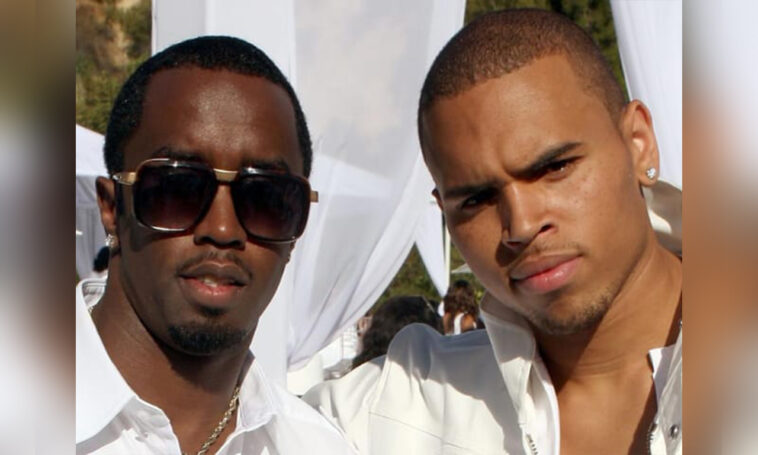The recent Investigation Discovery (ID) documentary, Chris Brown: A History of Violence, explores serious allegations against Chris Brown, including claims of assault, intimate partner violence, and new accusations of sexual assault. The documentary aired on Sunday night and delves into the rapper’s violent history, revisiting allegations spanning from his 2009 assault of singer Rihanna to more recent accusations in 2020. Among the testimonies, an anonymous accuser, identified as “Jane Doe,” alleges Brown drugged and raped her aboard Sean “Diddy” Combs’ yacht in Miami.
Jane Doe recounts that during a party on Diddy’s yacht, she spoke briefly with Brown about her career, and he offered her drinks. After consuming two drinks, she felt suddenly drowsy and eventually found herself in a bedroom where she alleges Brown assaulted her. “I remember laying back and thinking, ‘Why can’t I get up?’ The next thing I know, he was on top of me, and I couldn’t move,” she shared, detailing that despite her protests, Brown allegedly proceeded with the assault. Jane Doe’s attorney, Ariel Mitchell, who had briefly withdrawn from representing her in 2022 due to undisclosed evidence, has since renewed her support for the accuser, stating the withheld evidence does not detract from the veracity of her client’s claims.
The documentary covers multiple accusations against Brown, including the high-profile 2009 assault on Rihanna. Graphic details of this incident were shared by former LAPD sergeant Cheryl Dorsey, who recalled that Brown, while driving, punched Rihanna repeatedly as they traveled through Los Angeles, leading to his eventual guilty plea for felony assault. This case became one of the most publicized incidents of intimate partner violence in recent memory, placing Brown under intense public scrutiny and sparking widespread discussion on domestic violence.
ID’s documentary also revisits allegations from Brown’s ex-girlfriend, Karrueche Tran, who sought a restraining order against him in 2017, claiming that Brown had punched her in the stomach and pushed her down stairs. Tran’s testimony highlighted Brown’s pattern of alleged violence and his attempts to control and intimidate. Brown has consistently denied these allegations, including those made by another accuser, Liziane Gutierrez, in 2016. Gutierrez claims Brown punched her at a private event after she attempted to take his picture, an incident she reported to the Las Vegas Police Department, though no charges were filed.
While Brown’s legal team has denied all accusations, the documentary sheds light on systemic challenges victims often face when seeking justice. In interviews with The Hollywood Reporter (THR), ID President Jason Sarlanis explained that the documentary is part of ID’s No Excuse for Abuse campaign, which aims to “normalize surviving” and bring awareness to the institutional barriers that victims of domestic violence encounter. Sarlanis highlighted that in many domestic violence cases, the judicial system’s limitations often prevent victims from finding justice on their own terms. “The statute of limitations when it comes to domestic violence is painfully short,” Sarlanis said, noting that victims can be further harmed by manipulation and coercion, making it difficult for them to come forward within the restricted legal timeframe.
The program has sparked discussions around domestic violence and the lingering effects on survivors. The View co-host Sunny Hostin, a former prosecutor, hosted a special discussion following the documentary, emphasizing that intimate partner violence knows no boundaries and can impact individuals across all demographics. Hostin urged viewers to understand the wide-reaching implications of abuse and the challenges faced by survivors.
As the documentary revisits Chris Brown’s troubled history, it also raises questions about the responsibility of celebrities to address their past actions and the need for legal reforms to better support survivors. Brown’s legal team has maintained that the allegations in the documentary are “malicious and false,” but the renewed focus on these cases illustrates the broader issue of how alleged patterns of abuse within the entertainment industry often persist.
Public reactions have been mixed, with some supporting the accusers’ bravery in coming forward and others questioning the timing and motives of the documentary’s release. For those involved, the documentary serves as a platform to amplify stories of survival and to bring attention to the barriers in place for victims of abuse seeking justice. As the MeToo movement has shown, survivors coming forward and speaking out can contribute to significant shifts in how society addresses and understands abuse in all its forms.
As ID’s No Excuse for Abuse campaign continues, Chris Brown: A History of Violence serves as both a stark reminder of past allegations and a rallying call for improved legal protections for survivors. By presenting these accounts, ID aims to not only provide a voice to Brown’s alleged victims but also to shed light on the broader, systemic issues that leave survivors vulnerable and often without recourse in their pursuit of justice.





One Comment
Leave a ReplyOne Ping
Pingback:Chris Brown Sues Ample LLC, Warner Bros for $500M
Join the Community and Be a Part of the Conversation
You must be logged in or registered to post a comment.